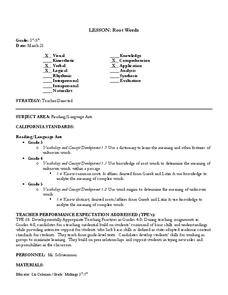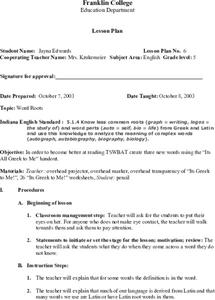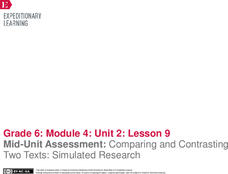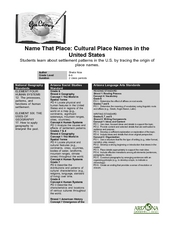Syracuse City School District
Greek and Latin Roots, Prefixes, and Suffixes
How can adding a prefix or suffix to a root word create an entirely new word? Study a packet of resources that focuses on Greek and Latin roots, as well as different prefixes and suffixes that learners can use for easy reference.
Curated OER
Latin Lingo
Did you know that the Greek and Latin root words that make up the scientific name of a creature often describe the animal? All the root words on this list relate to whales and dolphins. Learners examine the scientific names for dolphins...
Haut Gap Middle School
Root Words
Scholars demonstrate their knowledge of root words aqua and aud, and develop vocabulary skills by completing of a chart, handout, and worksheet using creative thinking skills, a dictionary, and a thesaurus.
Curated OER
Root Words from Greek and Roman Gods' Names
Prepare a stack of index cards with a Greek or Roman god's name on one side and their description on the other. Then, use the worksheet attached to brainstorm as many words that contain the root from each card. Pupils also create their...
Curated OER
What Does PAN Mean?
Do your middle school scholars need practice decoding words while reading or for spelling? The root word pan is the focus of a nine-step lesson that asks learners to discover ways to figure out the meaning of words built on a root that...
Curated OER
English Words from Greek and Roman Names of Gods
Hydra/hygiene, Muse/music. Many English words are built on roots derived from the names of Greek and Roman gods. After examining a list of Greek and Roman gods and the meaning of their names, class members find the root in a list...
Curated OER
Affix This
Wait, what am I supposed to affix? Explore the concept of roots/affixes with your class. They use discussion questions to discover the meaning and usage of specific roots and affixes. They watch a video explaining Latin and Greek roots...
Curated OER
Word Roots
Fifth graders discover that for some words, the definition is actually in the word and that much of our language is derived from Latin and many words have Latin roots. They look at the definition part of the worksheet and go over it...
Curated OER
Where Do Words Come From?
Students examine the foreign-language roots of various English words. Using the dictionary's word derivation notes and abbreviation key, they develop a list of words with a foreign-language origin, and create a class dictionary.
EngageNY
Research Tasks: New Words, Relevant Information, Revision
Word builders. Scholars participate in a mini instructional activity about affixes. They then complete a research vocabulary organizer and share their definitions of the words with the class. They gather more evidence for their research...
EngageNY
Summarizing Complex Ideas: Comparing the Original UDHR and the "Plain Language" Version
The eighth lesson plan in this series continues the focus on vocabulary and increasing young readers' awareness of academic language. Pairs of learners participate in a short vocabulary review activity called Interactive Words in which...
Curated OER
Cognate Detectives
Second graders examine how some root words are the same in English and Spanish. They explore cognates in Spanish and English language.
EngageNY
Mid-Unit Assessment: Comparing and Contrasting Two Texts: Simulated Research
Shoo fly. Scholars read DDT Spray Scares Mosquitoes Away, Study Finds and You Think You Have It Tough? to complete a mid-unit assessment. The learners compare and contrast author presentation and conduct a credibility check on each...
Curated OER
Name That Place: Cultural Place Names in the United States
Students examine the origin of the people that settled in the United States. In this United States History lesson, students work in small groups to complete several activities that explore early settlement, such as a worksheet, a...













